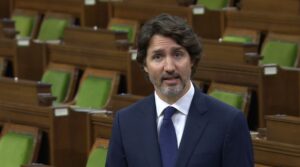Viruses and suspects: Rota challenges Trudeau about scientists fired in Winnipeg
 TORONTO – Anthony Rota challenges Justin Trudeau. The battleground is the controversial story surrounding the dismissal of two virologists of Chinese origin from the National Microbiology Laboratory, a maximum-security laboratory in Winnipeg where lethal viruses such as Ebola are studied. This tug-of-war, which has been developing for several weeks, has gone a little undertrack but is likely to lead to a serious institutional crisis between the legislative and executive powers here in Canada in the near future.
TORONTO – Anthony Rota challenges Justin Trudeau. The battleground is the controversial story surrounding the dismissal of two virologists of Chinese origin from the National Microbiology Laboratory, a maximum-security laboratory in Winnipeg where lethal viruses such as Ebola are studied. This tug-of-war, which has been developing for several weeks, has gone a little undertrack but is likely to lead to a serious institutional crisis between the legislative and executive powers here in Canada in the near future.
The Speaker of the House has repeatedly asked the government, during its speeches in the House of Commons, to hand over the documentation relating to the dismissal of the two scientists, Xiangguo Qiu and her husband Keding Chen. The Prime Minister, for his part, tried to build a wall, in the face of pressure from the Speaker of the House supported in this case by all the opposition parties, and decided to send the required documentation to the National Security and Intelligence Committee of Parliamentarians, a parliamentary committee whose members, given the importance of the sensitive data and issues discussed, are required to respect secrecy.
Rota did not like the move at all, which, it is useful to remember, was elected to the ranks of the Liberal Party like Trudeau himself: in recent days the legal aides of the Speaker have warned the federal justice minister that the dispute will be brought to court. It is therefore a very difficult institutional confrontation, with uncertain results, which undermines the stability of a government, the liberal government, which cannot even count on a parliamentary majority and which is now in danger of finding itself with divisions and controversies within it.
Rota, speaking in the House, reiterated that “the legal system has no jurisdiction over the operations of the House of Commons. We are our jurisdiction.” He added that there were parliamentary practices and procedures that must be respected, including by the government. And in his view, in this case, the executive has bypassed and bypassed the prerogatives of the federal parliament.
But the affair, over and above the institutional tug-of-war, has many controversial elements. The Public Health Agency of Canada (PHAC) has refused from the outset to make public the reasons for the dismissal of the two scientists. The president of this agency, Iain Stewart, has repeatedly stated that the Canada Evidence Act prevents him from providing sensitive information unless there is a direct authorization from the Ministry of Justice or the Federal Court.
Xiangguo Qiu and Keding Cheng, along with a group of Chinese students and researchers, were removed from the laboratory on July 4, 2019, without any official explanation, while the dismissal was announced in January 2020. The two scientists worked in the level 4 laboratory, which is to be studied the most dangerous viruses for humans.
According to data collected by the CBC, there is evidence that Qiu sent samples of Henipavirus and The Ebola virus from the Canadian laboratory in Winnipeg to the Chinese laboratory in Wuhan, the city where the World Health Organization said Covid-19 developed before becoming a planetary epidemic. This has given rise to a thousand doubts, fuelled also by the Trudeau government’s decision to cover up history.


